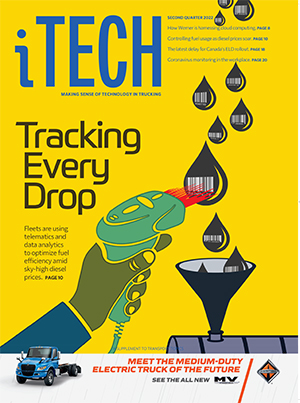Managing Editor, Features and Multimedia
How AI Is Streamlining Freight Movement
[Find the latest in trucking technology: Explore this quarter's issue of iTECH]
While the concepts of artificial intelligence and machine learning are not new, rapid advances in this field are driving the future of software development in the freight transportation industry.
Increasingly, technology vendors are utilizing AI and ML to bring greater efficiencies to the digital ecosystem that connects freight, including transportation management systems, load boards and pricing and capacity management tools.
Several developers offered insights into how they are harnessing AI during an April 8 panel discussion at Transportation Intermediaries Association’s 2022 Capital Ideas Conference & Exhibition in San Diego.

Clevenger
Criss Wilson, a data scientist at McLeod Software, said AI and ML can help make sense of the vast amount of data collected by trucking and logistics companies and their technology suppliers.
McLeod, for one, has 137 integrations with electronic trading partners, Wilson said.
He likened the situation to standing in the middle of a large crowd with everyone talking simultaneously.
“Which one do you listen to? Which one do you act on? Which one should you prioritize? There’s no human being that can listen to 137 voices — distinct and individual — to aggregate, understand and prioritize in order to take action. That is beyond our human capability,” Wilson said. “For us, AI and ML is prioritizing all these different signals and figuring out which one needs to be seen and heard loudly.”
Parade, a tech company that offers a capacity management tool for third-party logistics providers, is using AI in a variety of ways, including data collection.
For us, [artificial intelligence] and [machine learning] is prioritizing all these different signals and figuring out which one needs to be seen and heard loudly.
Criss Wilson, data scientist for McLeod
The company uses a natural language processing model trained in trucking lingo to parse out relevant information from emails, said Tony Wu, Parade’s co-founder and chief technology officer.
“At the end of the day, data is king in the ML space,” Wu said. “How much accurate, clean, quality data you have determines how well your application is going to perform.”

Q2 iTECH
►Using Technology to Track Fuel Efficiency
►Clevenger: How AI Is Streamlining Freight Movement
►Canada's ELD Mandate
►Dysart: Guarding Against Coronavirus
►5 Questions: Daragh Mahon, Werner Enterprises
Explore the Issue!
Another vendor, Greenscreens.ai, is using AI and ML to enable dynamic freight pricing.
Dawn Salvucci-Favier, the company’s CEO and chief product officer, also emphasized the value of high-quality data for AI applications.
“The more data the algorithm has, the smarter it gets, the better job it can do,” she said.
Ultimately, improved market visibility should help carriers, freight brokers and other players in the transportation industry build better business relationships and work together with less friction.
“We believe transparency of information creates trust,” said Brent Hutto, chief relationship officer at load board operator Truckstop.com.
Technology adoption has given modern transportation companies access to an ocean of data on their operations and better insight into broader market conditions. The next step forward is figuring out better ways to truly utilize all that information. AI and ML will play a leading role in that process.
Want more news? Listen to today's daily briefing below or go here for more info:





